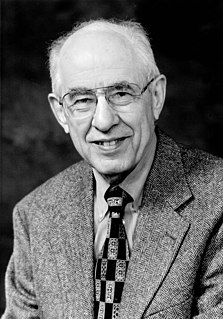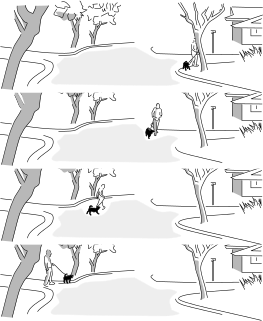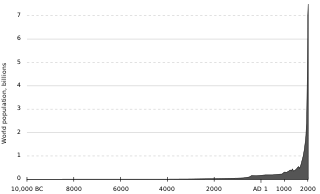Related Research Articles

The Einstein–Podolsky–Rosen paradox is a thought experiment proposed by physicists Albert Einstein, Boris Podolsky and Nathan Rosen (EPR), with which they argued that the description of physical reality provided by quantum mechanics was incomplete. In a 1935 paper titled "Can Quantum-Mechanical Description of Physical Reality be Considered Complete?", they argued for the existence of "elements of reality" that were not part of quantum theory, and speculated that it should be possible to construct a theory containing them. Resolutions of the paradox have important implications for the interpretation of quantum mechanics.

Determinism is the philosophical view that all events are determined completely by previously existing causes. Deterministic theories throughout the history of philosophy have sprung from diverse and sometimes overlapping motives and considerations. The opposite of determinism is some kind of indeterminism or randomness. Determinism is often contrasted with free will, although some philosophers claim that the two are compatible.

Hilary Whitehall Putnam was an American philosopher, mathematician, and computer scientist, and a major figure in analytic philosophy in the second half of the 20th century. He made significant contributions to philosophy of mind, philosophy of language, philosophy of mathematics, and philosophy of science. Outside philosophy, Putnam contributed to mathematics and computer science. Together with Martin Davis he developed the Davis–Putnam algorithm for the Boolean satisfiability problem and he helped demonstrate the unsolvability of Hilbert's tenth problem.

In the philosophy of space and time, eternalism is an approach to the ontological nature of time, which takes the view that all existence in time is equally real, as opposed to presentism or the growing block universe theory of time, in which at least the future is not the same as any other time. Some forms of eternalism give time a similar ontology to that of space, as a dimension, with different times being as real as different places, and future events are "already there" in the same sense other places are already there, and that there is no objective flow of time.

In philosophy, philosophy of physics deals with conceptual and interpretational issues in modern physics, many of which overlap with research done by certain kinds of theoretical physicists. Philosophy of physics can be broadly divided into three areas:

The Doomsday argument (DA) is a probabilistic argument that claims to predict the future number of members in the human species given an estimate of the total number of humans born so far.

Charlie Dunbar Broad, usually cited as C. D. Broad, was an English epistemologist, historian of philosophy, philosopher of science, moral philosopher, and writer on the philosophical aspects of psychical research. He was known for his thorough and dispassionate examinations of arguments in such works as Scientific Thought (1923), The Mind and Its Place in Nature (1925), and Examination of McTaggart's Philosophy.
A temporal paradox, time paradox, or time travel paradox is a paradox, an apparent contradiction, or logical contradiction associated with the idea of time and time travel. In physics, temporal paradoxes fall into two broad groups: consistency paradoxes exemplified by the grandfather paradox; and causal loops. Other paradoxes associated with time travel are a variation of the Fermi paradox and paradoxes of free will that stem from causal loops such as Newcomb's paradox.
The self-referencing doomsday argument rebuttal is an attempt to refute the doomsday argument by applying the same reasoning to the lifetime of the doomsday argument itself.

Rebecca Newberger Goldstein is an American philosopher, novelist, and public intellectual. She has written ten books, both fiction and non-fiction. She holds a Ph.D. in philosophy of science from Princeton University, and is sometimes grouped with novelists such as Richard Powers and Alan Lightman, who create fiction that is knowledgeable of, and sympathetic toward, science.
Richard J. Dennis, a commodities speculator once known as the "Prince of the Pit," was born in Chicago, in January, 1949. In the early 1970s, he borrowed $1,600 and reportedly made $350 million in about six years. When a futures trading fund under his management incurred significant losses in the stock market crash of 1987 he retired from trading for several years. He has been active in Democratic and Libertarian political causes, most notably in campaigns against drug prohibition.
Epistemology or theory of knowledge is the branch of philosophy concerned with the nature and scope (limitations) of knowledge. It addresses the questions "What is knowledge?", "How is knowledge acquired?", "What do people know?", "How do we know what we know?", and "Why do we know what we know?". Much of the debate in this field has focused on analyzing the nature of knowledge and how it relates to similar notions such as truth, belief, and justification. It also deals with the means of production of knowledge, as well as skepticism about different knowledge claims.
Jeremy Nicholas Butterfield FBA is a philosopher at the University of Cambridge, noted particularly for his work on philosophical aspects of quantum theory, relativity theory and classical mechanics.
Causal decision theory is a mathematical theory intended to determine the set of rational choices in a given situation. It is a school of thought in decision theory. In informal terms, it maintains that the rational choice is that with the best expected causal consequences. This theory is often contrasted with evidential decision theory, which recommends the action which would be indicative of the best outcome if one received the "news" that it had been taken.
John L. Pollock (1940–2009) was an American philosopher known for influential work in epistemology, philosophical logic, cognitive science, and artificial intelligence.

Simon Wolfe Saunders is a British philosopher of physics. He is noted for his work on quantum mechanics, on identity and indiscernibility in physics, and on structural realism.
Tim William Eric Maudlin is an American philosopher of science who has done influential work on the metaphysical foundations of physics and logic.
The von Neumann–Wigner interpretation, also described as "consciousness causes collapse", is an interpretation of quantum mechanics in which consciousness is postulated to be necessary for the completion of the process of quantum measurement.

Yemima Ben-Menahem is a professor (Emerita) of philosophy at the Hebrew University of Jerusalem. Her main area of expertise is philosophy of science, in particular philosophy of modern physics.
References
- ↑ Eckhardt, William (July 1993). "Probability and the Doomsday Argument" (PDF). Mind.